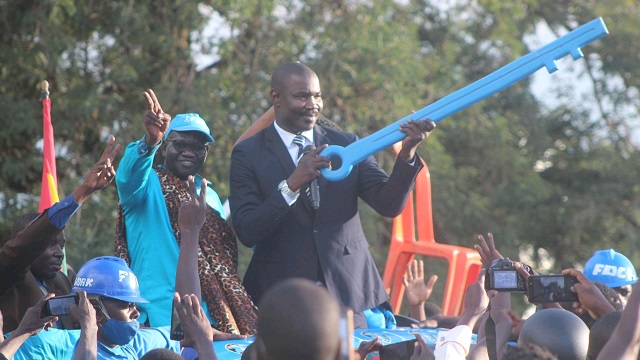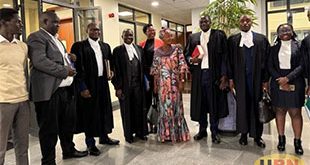
Kampala, Uganda | THE INDEPENDENT | The Forum for Democratic Change-FDC went into the 2021 general elections as the largest opposition party in the country. But when the final whistle was blown, the verdict had been different, not only had it lost to the ruling National Resistance Movement-NRM but also to the newcomer the National Unity Platform-NUP.
According to figures by the Electoral Commission, the FDC won 32 parliamentary seats against 55 won by the National Unity Platform-NUP. On the other hand, the NRM maintained its numerical strength winning 341 of the 529 that make up the 11th parliament. This means that now NUP will be providing parliamentary leadership that FDC has dominated since the return of multiparty politics in 2006.
According to party officials who spoke to Uganda Radio Network-URN for this story, this performance although not stellar defied many naysayers who had predicted doomsday for the party. They argue that FDC went in this year’s election amidst turmoil both internal and external to it.
For example, a rift that was created by the departure of the former party president Gregg Mugisha Muntu had not yet closed by the time the party went to elections. Muntu who eventually formed his own political party, the Alliance for National Transformation-ANT, went away with a significant number of senior party members. The turmoil according to party officials also scared away those who would have contested on the party ticket. Before the election, of the 37 MPs the party has in the 10th parliament, only 22 contested again on the party ticket.
According to Patrick Amuriat Oboi, the party president who was also its flagbearer in the presidential election, those who wanted to kill FDC were unsuccessful. Amuriat who was elected party president in 2017, said he was happy that the party proved a hard nut to crack by its distractors.
The point was emphasized by Ssemujju Ibrahim Nganda, the MP for Kira municipality. Of the five MPs that FDC has in Buganda, Ssemujju was the only one who survived the NUP onslaught. The party lost the other four seats which include, Kampala Woman, Makindye East, Kawempe South and Nakawa seats.
However, the party was able to pick up two other seats in Mawokota South and Kyamuswa county. Ssemujju who speaks for the FDC said as a party, they faced resistance from many directions that distracted their efforts of engaging in a normal election preparation.
Ssemujju who was Muntu’s campaign manager while he contested for the FDC presidency also blamed their woes on the fallout from the change of party leadership to its third president. Although he is proud of the record the FDC has set as a party that regularly changes leadership, Ssemujju added that the party spent a lot of time trying to contain some of its members who had made it a job to tarnish the party’s reputation.
Amuriat also said that the fact that many of the former party members were actually defeated by FDC candidates is testimony that the party support base is intact despite the belief by some people that there was an ideological difference in the party that threatened its survival.
Dr Sam Kazibwe, a political commentator and lecturer at Uganda Christian University believes that although FDC lost five seats in the recent election, it nevertheless performed far much better than many observers had expected.
The defeat of almost all the MPs who left the FDC party according to Kazibwe was testimony that it was a façade that there were ideological differences in the party. Kazibwe added that looking at the history of the FDC, it was clear that the party was formed on the basis of defiance and that the Muntu group that didn’t believe in this ideology joined something they had no idea about.
Of the 15 MPs who left the FDC, only Abdul Katuntu and Elijah Okupa were reelected in Bugweri county and Kasilo county respectively. Jack Wamai Wamanga of Mbale Municipality and Winnie Kiiza of Kasese never contested.
What next?
Now that the FDC’s influence as the biggest opposition party is whining, the question that many people are asking themselves is what is next for the party. According to Amuriat, they are picking up the pieces and rebuilding the party which he said presents the most chances of defeating NRM. Amuriat added that they will also not be missing anything from being the leaders of the opposition. In any case, Amuriat said they never set out to be in the opposition. He said every time they have participated in an election was to take power in order to better the lives of Ugandans.
Yusuf Serunkuma, a researcher at Makerere University says that it doesn’t matter at all who is the leader of the opposition in Parliament.
“All Ugandan political parties have rough internal contestations, and the mess we have seen in the last four years is indicative of a national condition. We have reached a time where only resistance matters and the traditional leader of the opposition is simply symbolic. In fact, if any parties were truly revolutionary, they would not even accept playing any role as opposition in Uganda’s parliament,” Serunkuma said.
He added that opposition parties should allow members of the NRM to form their own opposition, because not doing so renders credibility to Museveni hence making Uganda appear like a democracy.
“The FDC became the leader of the opposition because it packaged itself as the one most suited to force Museveni out of office. With the revolutionary winds pushing in the direction of NUP, they also take that simply symbolic decision. But it is meaningless. It actually perpetuates the status quo, giving Museveni the façade of a democrat. The only role any political party can play in the post-election Uganda is resistance,” Serunkuma said.
For FDC to keep relevant as the NUP takes over as the leader in parliament, Serunkuma added, they should rebrand the party and add resistance to its name. “After Museveni is fallen they can kick off R and C and remain Forum for Democracy (FD). Otherwise, there is no role for an opposition political party under a 35-year-old autocracy which is determined to retain power through lip service to democracy,” Serunkuma said.
For Amuriat, the party is going to continue struggling as it has done for the last 15 years. “It is good that new people come and endure the kind of frustration that we have endured all this time. If they are able to pick anything well and good but I’m highly pessimistic whether there is anything that institution[parliament] will offer to Ugandans,” Amuriat said.
He added that starting next week, they will embark on a countrywide campaign to mobilize Ugandans to continue with resisting what he called an illegitimate government of President Yoweri Museveni. With a new terrain and players, whether this new campaign will yield any results let alone be embraced by Ugandans is everyone’s guess. But for now, the party has to confront it’s traditional political nemesis, the NRM and the new pacesetters in the opposition.
*****
URN
 The Independent Uganda: You get the Truth we Pay the Price
The Independent Uganda: You get the Truth we Pay the Price



